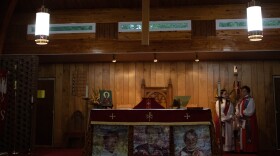For people of the Jewish faith, fall is a time of celebration and self-reflection. The High Holidays began with Rosh Hashanah and wrapped up this past weekend with Simchat Torah. Jenny Blass is an 11th grade student at East Chapel Hill High School. She produced this story as part of WUNC’s Youth Reporting Institute:
I used to live in a large Jewish community in New Jersey, but in eight grade I moved to Chapel Hill, and I quickly realized I was different. Sure, there are Jews in North Carolina, but my family is frum, or observant, to a degree that’s considered unusual around here.
Judaism is really important to me, but at the same time, I’m still a typical teenager. I go to public school, write for my school paper, and I really like Japanese anime and foreign languages. But I also have all sorts of religious obligations I have to consider in my day-to-day life.

Sometimes I feel stuck between two worlds, Jewish and non-Jewish. At school, this used to make me feel awkward. I constantly found myself explaining things I considered normal — for instance, Kashruth, or Jewish dietary restrictions. There are a lot of rules and regulations about what is considered kosher. For example, meat and milk can’t be eaten at the same meal, and animals have to have split hooves, so things like cheeseburgers and pepperoni pizzas are off limits. Kashruth makes school lunch or dining out with friends complicated for me.
Then, there’s Shabbat, or Shabbos. Shabbos begins every week at sundown Friday night and ends Saturday night. It’s a day of rest, and there are all sorts of restrictions surrounding it. You can’t write, drive, cook or use electronic devices. Fridays at my house, my mom cooks all the food that we’ll eat on Shabbos. There’s always a last minute scramble before sundown to get ready. I’m in charge of filling up some pitchers with water — because the filter on our fridge is electrical, so we can’t use it during Shabbos.
Shabbos is a real social-life killer. If there’s an event on Friday night or Saturday, I can never go — so I miss out on a lot of parties and school dances. I had to jump through all sorts of hoops to take the SAT on a Sunday. I had to hunt down a physical application, get a note from my rabbi explaining my situation, mail that, and then wait three weeks before I was allowed to take the test.

Right now, we are at the end of the High Holidays, a bunch of holidays we celebrate in the fall. This is one of my favorite parts of the year, but it can be an academic nightmare. These holidays can fall on weekdays, which means I have to miss school. Last year, by the end of October, all my grades had dropped. I try and explain to my teachers that it's like I vanished off the face of the earth. I can't contact them. I can't do schoolwork. Sometimes they get it, sometimes they don’t.
It can be a lot to balance Shabbos and the Jewish holidays with school and my friends, but these moments give me the opportunity to spend time with my family, without any distractions like phones, or video games, or school assignments. For a lot of people nowadays, I think that’s a rare experience.
Judaism gives me structure in my life and helps connect me to my roots and community. It makes me different, but it gives me a powerful sense of who I am.










